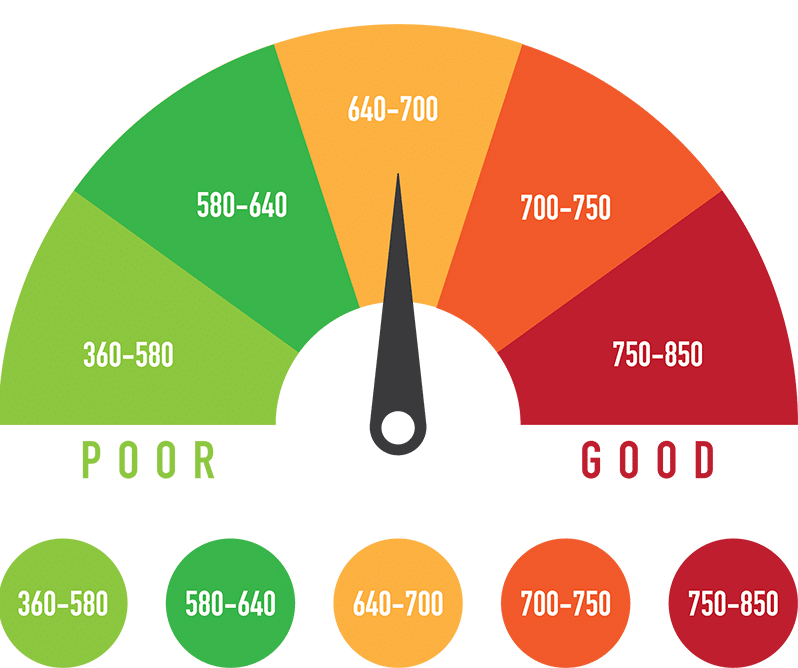Among the things that lenders look at when you make a mortgage application is your credit score. It determines whether you qualify for the loan or not. It also plays a big role in the principal amount and interest rates.
Typically, a high score translates to healthy financial management hence a lower risk of defaulting. This gets you better rates. On the other hand, a low score represents mismanagement of credit. This makes you more likely to default and lenders will offer higher rates to minimize the risk.


Credit Score Ranges
To better understand how credit score affects your mortgage rates, let’s look at FICO credit score. This is the credit rating system used by the majority of lenders across the US. It uses your credit reports data from the main credit bureaus; Experian, Equifax, and TransUnion to come up with a 3-digit figure. From this, your rate is determined from a 6-tier system that grades credit scores out a possible 850 points.
Using a 30-year fixed mortgage as an example, here is how rates compare across the different tiers;
Tier One (760-850)
A borrower in this range represents the lowest risk to lenders. The tier represents exceptional credit management. You get to enjoy the best rate there is in the market as of today; an Annual Percentage Rate also known as APR, of 4.204%.
Tier Two (700-759)
If your score falls on this tier, then you are very good at managing your finances. It shows that you are a dependable borrower. This gets you an APR of 4.426%.
Tier Three (680-699)
The national average of 695 falls under this tier. A score in this range is considered as good. Borrowers in this range will easily get their loan application approved though at average rates. From the example, most lenders will offer the loan at about 4.603% APR.
Tier Four (660-679)
Scores that fall within this range are considered fair. While most lenders will agree to the mortgage application, it will be at a much higher rate compared to the upper tiers (4.817%). The loan will also come at much more stringent terms like a heftier down payment. Borrowers in this category will have to do more shopping around if they wish to land lenders with competitive rates.
Tier Five (640-659)
Mortgages in the upper tiers are known in the industry as prime loans. Those that fall in tier five and below are referred to as Subprime Mortgages. The Consumer Financial Protection Bureau (CFPB) defines them as a loan that is meant to be offered to prospective borrowers with impaired credit records.
Borrowers whose score falls on this tier are considered potential defaulters. Their mortgages present considerable risk to the lenders. To mitigate this risk, the loans come with stringent terms. This may include measures such as co-signing and collateral.
Apart from attracting considerably higher rates than the national average, subprime loans can be more restrictive. Most will be offered as adjustable rate mortgages (ARMs); their APR can change outstandingly in the course of the loan term.
Tier Six (620-639)
Scores in this tier will get you the lowest rates; that would be 5.793% for the 30-year mortgage. Qualifying will be difficult and if approved, you will be required to have a co-signer as well as collateral. You may also have to do with an APR loan.
Credit Scores Below 620
Conventional lenders will not offer loans to borrowers whose score is below tier six. However, borrowers in this category can qualify for FHA mortgages. These come at smaller down payments (3.5%) and potentially lower interest rates. They are however restrictive on the maximum amount that one can borrow. They also attract a higher Private Mortgage Insurance (PMI) than conventional mortgages.
How Rates Compare
To put this into perspective, consider a 30-year $250,000 fixed mortgage with a 20% down payment. Let’s see how different rates compare in reference to the top-tier scores.
| Credit Score Range | APR | Monthly Payment | Total Interest | Difference |
| 760-850 | 4.20% | $1,223 | $190,325 | (best rate) |
| 700-759 | 4.43% | $1,255 | $202,068 | $11,743 |
| 680-699 | 4.60% | $1,282 | $211,541 | $21,216 |
| 660-679 | 4.82% | $1,314 | $223,124 | $32,799 |
| 640-659 | 5.25% | $1,380 | $246,816 | $56,491 |
| 620-639 | 5.79% | $1,465 | $277,676 | $87,351 |
The Take Away
From the above information, it’s evident that credit scores greatly affect mortgage rates. An upward bump from a low score can save you tens of thousands of dollars in the long run. At the same time, lenders can increase your monthly repayments even during the loan repayment period. This will be occasioned by a significant drop in your credit score.